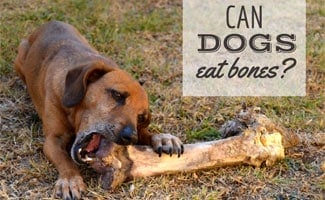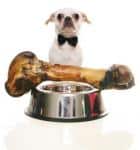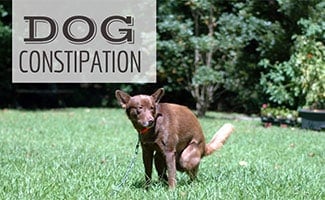Are Beef Bones Safe for Puppies
To keep the lights on, we receive affiliate commissions via some of our links. Our review process.

"Give a dog a bone" — a common saying we've all heard, but in reality, should you satisfy those pitiful eyes begging you for your leftover bone from dinner?
We all know dogs consider a bone a prized possession, but do you know which bones are safe, and what do you do if your dog eats a bone that's harmful?
Find out all the answers to your questions and more in our comprehensive guide to safe bones for dogs.
- What Types Of Bones Can Dogs Eat?
- Beef Bones
- Chicken Bones
- Turkey Bones
- Pork Bones
- Lamb Bones
- What Do I Do If My Dog Eats A Bad Bone?
- Can Dogs Eat Bones Infographic
- How To Help A Choking Dog
- What Other Foods Should I Keep Away From My Dog?
What Types Of Bones Can Dogs Eat?

Although it depends on the type of animal bone, you should follow some general rules when considering giving your dog this "treat".
- Raw vs cooked: Can dogs eat raw (uncooked) bones? Most veterinary experts agree that it's much safer to give your dog raw bones than cooked bones. Cooking causes bones to soften and increases the risk of bones splintering when chewed. Raw bones are also an excellent source of minerals and vitamins. However, raw bones may contain bacteria that cause food-borne disease, so talk with your vet about how to handle the bones safely to prevent illness in you and your dog.
- Bone size: Opt for large, thick bones rather than small or narrow bones. Dogs are less likely to chew down large bones into shards and smaller pieces they can swallow.
- Existing digestive problems: If your dog suffers from digestive issues, such as irritable bowel syndrome (IBS) or frequent diarrhea, then it's a good idea to take all bones off the table. Bone marrow is extremely rich and can exacerbate these problems.
Beef Bones

One of the most frequent questions we see is, "can dogs eat beef rib bones?" Yes, as long as they're large. Beef bones are naturally harder than most other types of animal bones, making them more difficult for dogs to break down. Can dogs eat steak bones? The same rule applies as with rib bones.
Can dogs eat cooked beef bones? There's been some disagreement among veterinary experts in the past on this issue, but the general consensus is that cooked bones, regardless of the type, are not good for dogs. Talk with your vet about feeding your dog cooked beef bones.
Chicken Bones
Can dogs eat cooked chicken bones (or raw, for that matter)? The consensus on chicken bones of any kind is a resounding NO. Why? Chicken bones, especially when cooked, easily break and splinter. This can cause your dog to choke from bones getting caught in their throat.
Even worse, the sharp, splintered bones can puncture your dog's gastrointestinal tract, which not only can cause extreme pain and infection but can also lead to death if not treated immediately.
Turkey Bones
Turkey bones splinter easily like chicken bones. So, feeding turkey bones of any kind (raw or cooked) is not recommended.
Pork Bones
Like chicken bones, veterinary experts typically agree that pork bones aren't safe, whether they're cooked or raw. This includes pork ribs, ham bones, and pork chop bones. The adverse health effects can be the same as you'd see with chicken bones.
Lamb Bones
Lamb bones are more similar to beef bones in their density. So, follow the same rules as for beef bones. Raw is better but cooked is okay if the lamb bone is large and thick.
What Do I Do If My Dog Eats A Bad Bone?
We all try to be responsible pet parents, but pups can be sneaky and steal a bone off a plate or counter when you turn your back for a second. So, let's say your crafty canine ate cooked chicken bones. What do you do? Stay calm and follow these steps:
Immediate Steps
- If you catch your dog in the act, try to take the bones awaybefore he gobbles them all down.
- Make sure they are not choking (see the video below for how to help a choking dog).
- Call your veterinarian to see if they have any immediate suggestions. Some vets recommend giving your dog a few pieces of white bread to help cushion their GI tract.1 Every situation is different, however, so be sure to call your vet asap.
Watch Your Dog Closely

Ingesting chicken bones doesn't necessarily lead to any problems, but it's crucial to keep a close eye on your dog for the next several days to make sure he's in the clear.
- If your dog exhibits any of these symptoms, go to your vet right away: vomiting, lethargy, abdominal bloating, not eating, constipation or straining to defecate, or bloody stool.
- Check your dog's stool for a few days to see if the bone fragments passed through.
- If you haven't seen the bones in his stool within 3-4 days, visit your vet to make sure the bones aren't stuck in your dog's GI tract.1
The injuries resulting from damage to a dog's intestinal tract could require expensive surgery. Signing up for pet insurance before your dog ends up in an unexpected veterinary emergency is an excellent way to reduce your financial risk as a pet owner.
Can Dogs Eat Bones Infographic
When in doubt, you can reference this handy infographic we created that summarizes tips about dogs eating bones.

How To Help A Choking Dog
If your dog is choking on a bone (or anything else), be sure to watch this brief video that illustrates how to help him right away until you can get him to your vet.
What Other Foods Should I Keep Away From My Dog?
If you've been in the habit of feeding your dog table scraps or giving them human food, stop what you're doing and read our article telling you what foods are toxic to dogs right away. You might be surprised at the number of foods dogs should never eat. You might also check out our rawhide alternatives article for some safe options for your dog to chew on.
Sources: [1] American Kennel Club
Tagged With: Food Safety
The information provided through this website should not be used to diagnose or treat a health problem or disease; it is not intended to offer any legal opinion or advice or a substitute for professional safety advice or professional care. Please consult your health care provider, attorney, or product manual for professional advice. Products and services reviewed are provided by third parties; we are not responsible in any way for them, nor do we guarantee their functionality, utility, safety, or reliability. Our content is for educational purposes only.
Source: https://www.caninejournal.com/can-dogs-eat-bones/